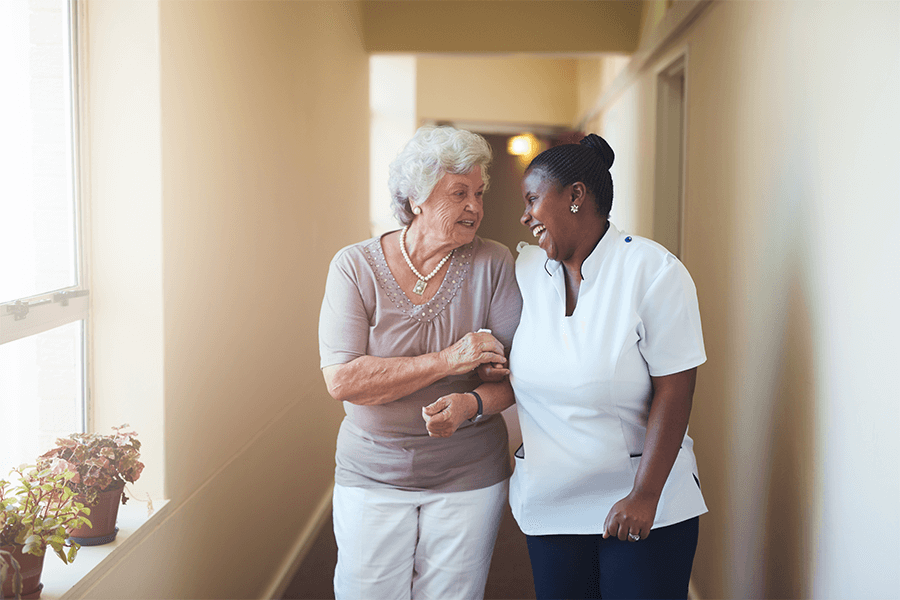Top 10 Caregiver Duties You Need to Know
The duties and responsibilities of a caregiver are never ending. One moment they may be shopping for groceries and the next arranging transportation to a specialist appointment, or even talking with their loved one about medication dosage!
They have so many duties that it is important to ensure continuity of care – whatever this entails.
It is often best to employ a team of caregivers, both paid and unpaid. These people can be the parent, spouse, son or grandchild of an individual who needs assistance with their daily tasks. The caregiver must adjust as new challenges come up every day in response to changes from the senior they are assisting.
Complexity of Senior Caretaking
The senior caregiving process can be more complicated than it seems. You may think you are doing the right thing by performing some of these tasks, but others could actually have a negative impact on your loved one’s well-being if not done properly and with consideration for their needs!
Senior care is both fulfilling and complex; just because two people share similar age doesn’t mean they will need the same things from caregivers to feel safe in their home or when going out into public spaces.
It would take an expert to know what each person’s individual level of functioning looks like so that time and energy isn’t wasted trying methods that don’t work best for them – which makes finding help even trickier.
What are the duties of caregivers?
Caregiver Duties
Common caregiver roles and responsibilities for caring for seniors in the home:
Care Planning
Caregiving can be a difficult task, so it’s important to plan ahead. You should create an intentional care plan that will help you manage your home and health responsibilities. This is something everyone involved in the process of providing care for others needs input on-the medical team, family members who are caring for their loved ones at home or those employed by nursing homes or assisted living facilities.
Once this has been created with all parties’ input, it’ll allow one to make sure they have coverage across every aspect of the life cycle: from education about chronic conditions like Alzheimer’s disease; food preparation strategies that take into account taste preferences but also dietary restrictions (elderly folks often need more protein); safe transportation methods when possible; and appropriate clothes
Being an Advocate
Caretaker duties can be tough and should not be taken lightly. With the never-ending list of tasks that come with this responsibility, it’s essential to have multiple caregivers so someone can always watch over your loved ones while another takes care of whatever needs tending at any given time. One person may need an escort into their doctor appointment in order for it to go as smoothly as possible; another could use help picking up food on the way home from work if they missed lunch today because they were busy caring for grandma like you would hope they do!
Prescription Management
When people are aging, their prescription needs can grow. As a result of developing more prescriptions every year, it becomes necessary to have one dedicated caregiver who oversees the prescribing and administration process for all patients. This way they will be able to prevent drugs from being stolen or misplaced when someone is stealing controlled substances because some medications that painkillers fall into this category may not be safe in certain situations if administered incorrectly.
Mobility Assistance
There’s a lot to learn when it comes to being the caregiver for an elderly person, but knowing how and what they need can help. Caregivers often have to move their loved one from place-to-place in order not only keep them safe at home, but also transport them outside of the house as necessary. While some moves may seem easy enough – like changing someone out of bed or into wheelchair – others are more difficult with potential risks such as falls waiting around every corner that could disable any senior citizen who is already struggling with mobility problems due poor vision/hearing etc… Knowing these “transfer” methods (methods used by caregivers during movement) inside and out will mean never making mistakes again on your own health nor theirs!
Personal Hygiene
Many aging loved ones only receive help with more intimate tasks of daily life once they start to have trouble with those same things. This is often called “Activities of Daily Living” and includes bathing, using the toilet, cleaning up after being sick or washing their hair. It’s a sensitive topic so make sure that your caregiver is kind natured and patient! You’ll also want someone handling these chores to have experience in working closely with elderly people as well…
Meals / Nutrition
It’s not enough to ask a caregiver to make meals. In fact, since many older adults lose their appetites and take in fewer calories as they age, the food they eat must be of the best nutrition possible! There is also consideration for whether foods will interact with medications or cause specific ailments like high blood pressure or diabetes.
Anyone handling grocery shopping, meal planning and food preparation should work side by side with a Registered Dietician (RD) who has experience caring for your loved one’s needs so that all meals are perfectly tailored specifically them.
Home Upkeep and Housekeeping
A good caregiver is not just someone who helps with daily activities like eating and getting dressed. They are also an invaluable friend, utilizing their skills to help out as needed in the home or office.
A skilled caretaker will have no problem handling basic tasks around the house such as light housekeeping, doing dishes or changing a lightbulb, when necessary, but they should never be expected to do anything outside of their job description that could expose them to injury (such as heavy lifting).
Companionship
Imagine a world where you are getting older and have no one to help care for your needs. You live in this state of loneliness until the day someone comes into your life that is willing to give up their time, energy, and resources just so they can make sure you’re well taken care of. As hard as it may be at times having caregivers around doesn’t feel like work; instead, relationships become more meaningful when difficult tasks arise during aging because there’s always people who will take on these challenges with open arms if needed which makes caring companionship all worth-while!
Transportation
As people age, they may feel the urge to withdraw and avoid going out. A supportive caregiver can provide some normalcy by driving them to social events or their needed medical appointments. Whether it’s picking up books at the library or getting your loved one where they need to go for a much-needed dental cleaning, having the means of transportation will help with providing a healthy quality of life!
Monitoring “Trends”
As a caregiver, it is important to watch for any changes in your loved one. It could be an indication that something isn’t right with their physical or mental health but also the mood they’re feeling that day. Those who care should speak up immediately and document what happens during each shift so everyone’s on the same page when making decisions about additional help needed – even if you are far away from home!
The Role of a Caregiver
When you take the time to care for an older loved one, it gives them a sense of security and reassurance that they need. There are so many reasons to be a caregiver.
For those who have been lucky enough to spend these years in this role, there are some amazing perks—the closest bond of their lifetime can form with such sweet moments spent together as your old loved one becomes more vulnerable; stories about youth start coming out among fears and concerns over aging.
The trusted position of caregiver also brings about unique insight into life itself. Only after caring for a senior loved one can, you truly appreciate how important it is to set up support systems for your golden years as well as conversations with your spouse and children about how you wish to be cared by them in the later decades, which will have an impact on their lives too.
Caregiving is one of the most rewarding and respected professions. You’ll develop patience, empathy, wisdom when you see your loved one through their elderly years filled with health problems like dementia or Alzheimer’s Disease. But it can be trying at times too – so make sure to take care of yourself as well!








